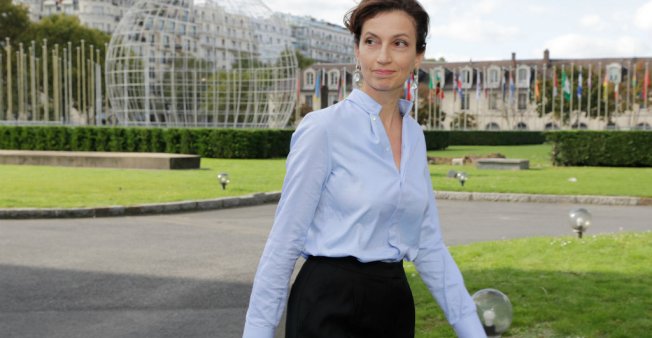Azoulay was elected to become UNESCO’s director-general for the next four years, beating the Qatari candidate Hamad bin Abdulaziz Al-Kawari by 30 votes to 28. Her victory is emblematic of how the collapse of diplomatic relations between Saudi Arabia and Qatar hampered a candidate from the Arab region’s chances to lead the Paris-headquartered international organisation.
Despite intense campaigning using Qatar’s financial might, Al-Kawari lost out due to his country’s diplomatic isolation among Arab countries. After two rounds of voting by the 58 members of UNESCO’s executive board, Al-Kawari led by 22 votes, but was deprived of a clear majority by Egypt’s candidate, Moushira Khattab, and Azoulay.
Egypt belongs to the Saudi-led coalition that has cut diplomatic ties with Qatar. Coincidentally, out of the nine candidates vying for the UNESCO post, four – also including Lebanon and Iraq – came from Arab countries.
Azoulay, whose father was an adviser to King Mohammed VI of Morocco, and who served as culture minister during François Hollande’s presidency, would have had more trouble winning if the Arab countries had managed to present a united front.
“The appointment of Audrey Azoulay is highly unusual as she comes from the country that hosts UNESCO but it is a sign of the times,” Dr Leslie Vinjamuri, associate fellow at London-based thinktank Chatham House, told FRANCE 24.
“Internal divisions in the Arab world, especially between Qatar and Saudi Arabia, and the failure of the Arab world to form a consensus around a single candidate are emblematic of divisions in the region,” said Vinjamuri.
“France’s rise, and in this case the appointment of Azoulay, should help to mitigate some of the politics that have divided UNESCO in recent years.”
Indeed, just one day before Azoulay’s win, the US announced its intention to withdraw from UNESCO by the end of 2018. “This decision was not taken lightly, and reflects US concerns with mounting arrears at UNESCO, the need for fundamental reform in the organisation, and continuing anti-Israel bias at UNESCO,” the US State Department said in a statement. It added that the US hoped to remain engaged as a non-member observer state.
The US withdrawal was largely due to the country’s view that UNESCO has an anti-Israel bias. In July, Nikki Haley, the US ambassador to the UN, called UNESCO’s listing of the West Bank city of Hebron as a Palestinian world heritage site an “affront to history”.
Israel followed suit and is also preparing to withdraw from UNESCO, which Prime Minister Benjamin Netanyahu has derided as a “theatre of the absurd”, saying in a statement that: “Instead of preserving history, it distorts it.”
The US’s anti-UNESCO stance predates the Donald Trump administration. In 1984, the US quit UNESCO but re-entered in 2003 under President George W Bush. In 2011, the Obama administration cut annual funding of around $80 million after Palestine became a full member. The US’s decision to withdraw from UNESCO a second time is dramatic, Vinjamuri believes, and expresses a lack of interest in “soft power” politics, such as science and culture.
“The US decision is clearly meant to be a dramatic, sharp departure which goes in line with much of President Trump has been doing, which is taking the US out of things,” Vinjamuri said. “It’s making a big, bold, brash statement about the US not staying in international organisations or meeting its international agreements and is part of Trump’s house-clearing exercise to reduce costs. Leaving UNESCO accelerates and exacerbates the game of America under the current administration, of not co-operating with Europe, and is inflammatory and damaging to America.”
Asked about how Israel’s departure could affect the status of the old city of Hebron as a UNESCO World Heritage site, Vinjamuri replied: “Israel’s departure is not going to change UNESCO’s decision on that, or on any material designation of somewhere as a cultural heritages site.”
“UNESCO isn’t going to be begging for Israel to come back,” Vinjamuri asserted. “UNESCO will move forward and Israel will be left behind, while the US will try to influence from the outside. It’s possible that the US may return again in the future but that’s a long way off at this point.”
Azoulay replaces Bulgaria’s Irina Bokova and is expected to take office on November 15, 2017.








































admin in: How the Muslim Brotherhood betrayed Saudi Arabia?
Great article with insight ...
https://www.viagrapascherfr.com/achat-sildenafil-pfizer-tarif/ in: Cross-region cooperation between anti-terrorism agencies needed
Hello there, just became aware of your blog through Google, and found ...